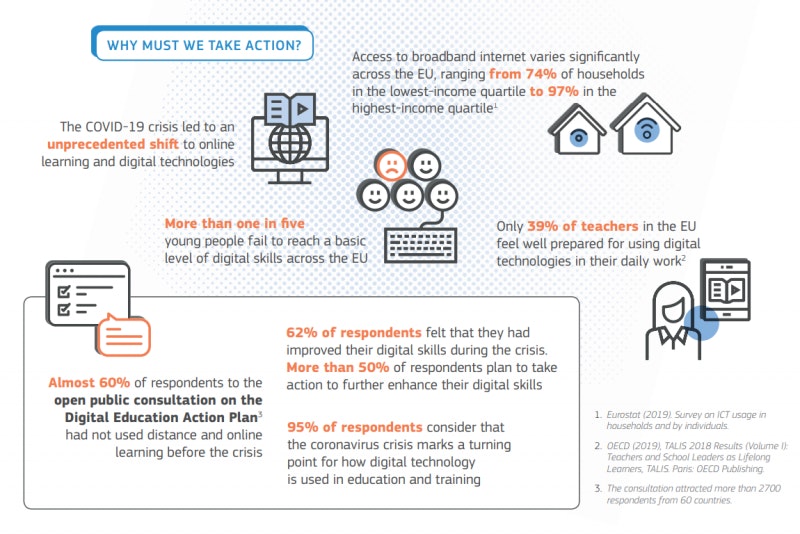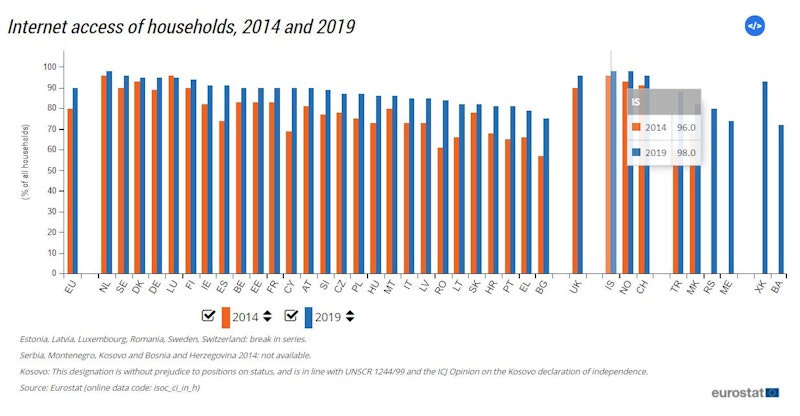Key Aspects of the European Commission's Digital Education Action Plan 2021-2027
The Education and Training department of the European Commission recently published the “Digital Education Action Plan 2021-2027” that is aligned with the point of view of the European Commission for inclusive, accessible and high quality digital education in Europe. This plan is a wake up call to mobilize for better cooperation between European countries. The two main objectives are to learn from the coronavirus crisis where technology is being applied at a level never experienced before in training and education, and build education and training systems suited for the digital era.
Previous Plan On Digital Education
The European Commission already had a 2018-2020 Education Plan with 3 main goals that laid the foundation for the new Education Plan.
- To develop digital skills and competencies
- To make better use of digital technology for training and teaching
- To improve education through better foresight and data analysis
The Digital Education Action Plan's Two Tactical Priorities
1. Increasing digital transformation capability and digital ability
The main needs for basic digital ability and capability from an early age:
- Education on computing
- Education on digital literacy (learn to deal with disinformation)
- Understanding of data intensive technologies (artificial intelligence for example)
Improved digital abilities will contribute by producing digital professionals and also make sure gender equality is represented in digital careers and studies.
How will the Commission respond?
- Updating the “European Digital Competence Framework” to incorporate artificial intelligence and skills related to data in schools, universities and different training providers.
- Creating guidelines for educators to encourage digital literacy and deal with disinformation through training and education, by coping with students, parents, technology companies…
- Developing a “European Digital Skills Certificate" that is accepted by governments, organizations, employers…
- Proposing a Council Recommendation to improve the plan of digital abilities in training and education. This would include to take advantage of European Union tools to finance educators professional development, share the techniques on high quality computing education, work with companies to spot and update needed skills.
- Encouraging higher participation in the “International Computer and Information Literacy Study”, which congregates data on student digital abilities.
- Stimulating female participation in STEM (Science, Technology, Engineering and Mathematics) with the EIT (European Institute of Innovation and Technology) and supporting the European Union STEM Coalitioan to expand higher education that attracts women.
- Selecting advanced digital skills development by extending the “Digital Opportunity Traineeships” to veteran learners and provide professional development opportunities for educators.

2. Supporting to develop a high quality digital education ecosystem
The main needs to create this environment:
- Well functioning digital development and capacity planning (with an updated organisational capabilities).
- Digital equipment, infrastructure and connectivity.
- Actualized learning content, secure platforms and user friendly applications.
- Educators that are digitally confident and competent.
How will the Commission respond?
- Initiating a strategic conversation with European Union Member States to create a plan for a Council Recommendation for successful digital education.
- Presenting a Council Recommendation on online learning focused in making distance learning inclusive, engaging and effective.
- Creating a “European Digital Content Framework” that will strengthen European creative and cultural diversity.
- Supporting connectivity in schools with digital equipment, e-learning platforms and applications…
- Helping digital transformation projects at every level of training and education through Erasmus.
- Creating ethical guidelines on AI (artificial intelligence) and the use of data in learning and teaching for educational staff.
The Reasons Why The European Commission is Taking Action
According to the Digital economy and society statistics study carried by Eurostat, households and individuals in the European Union, 1 in 5 young citizens don't reach a basic level of digital abilities.
Low income families haven't got access to computers, and depending on household income their broadband access has many limitations.
The coronavirus crisis created an extraordinary shift to the use of digital technologies and elearning.

The OECD Teaching and Learning International Survey (TALIS) concluded that in 2018 only 40% of teachers felt prepared to use digital technologies in teaching.
Results Of Public Consultation (2020)
95% think that the coronavirus crisis will have a direct impact on how technology is used in training and education in general.
60% of the participants in the consultation admit not having used online and distance learning before the pandemic.
More than 60% said that they had improved their digital abilities during the pandemic, and over 50% responded that they want to learn more.
Overall respondents communicate that online learning content and resources need to be more interactive, relevant and user friendly.
About the author
About EdTick
EdTick is a platform that helps educational institutions connect with academic software. Join our Beta program and help us shape the future of educational technologies!



